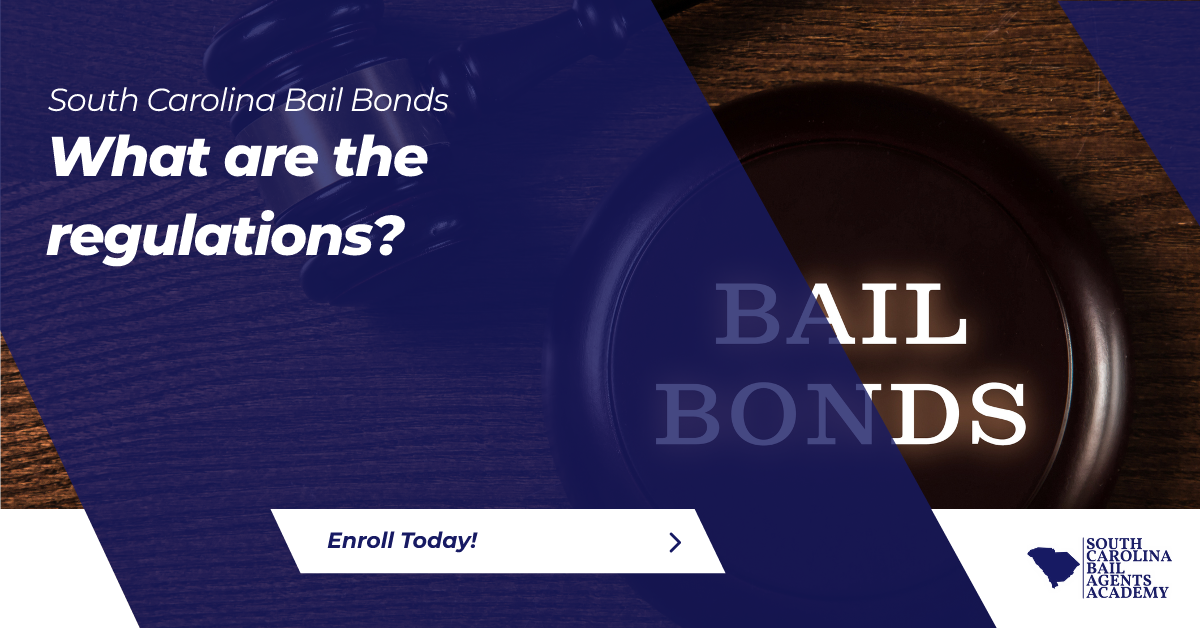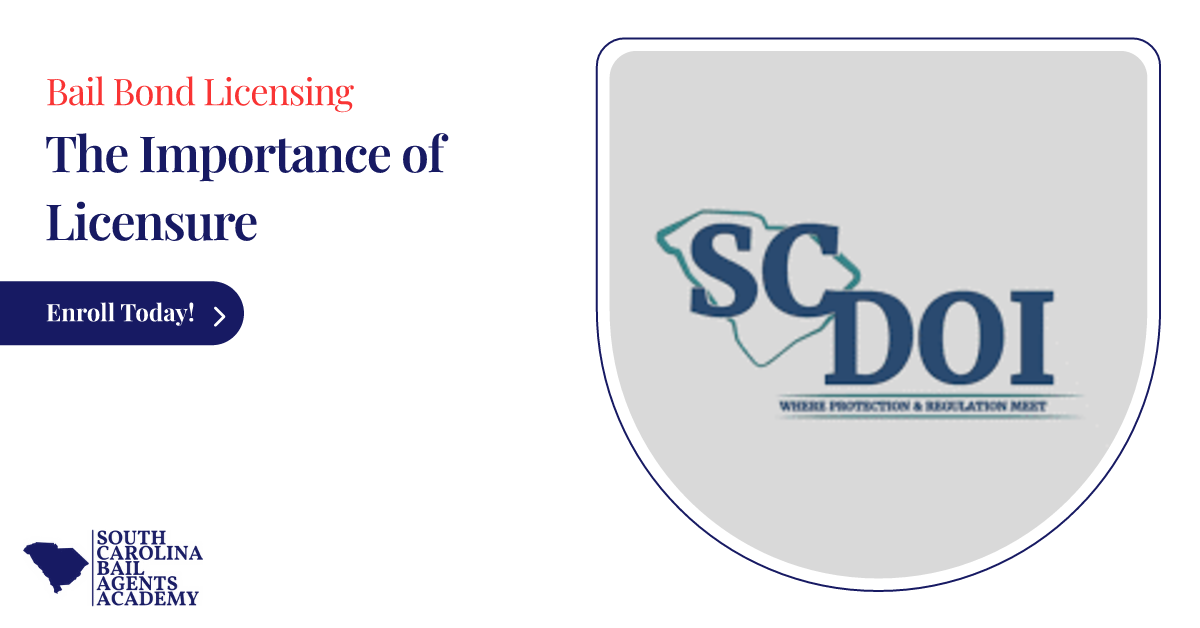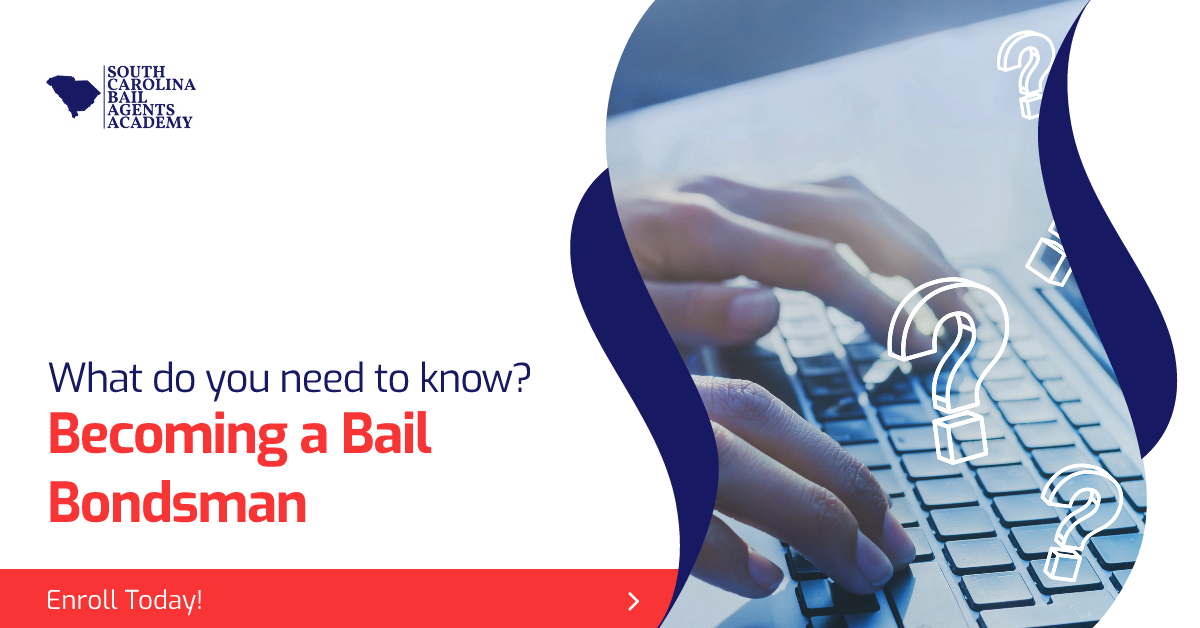|
Understanding South Carolina regulations Before starting as a bail bondsman in South Carolina, knowledge of the laws and regulations governing the industry is crucial. South Carolina imposes specific requirements and restrictions on the practice of bail bonding, which can vary from other states. Understanding the South Carolina Code of Laws related to bail bonds and the regulations outlined by the Department of Insurance is essential for a successful career in the bail bonds industry. Key areas to focus on include licensing requirements, permissible bail bond fees, and compliance with state regulations to ensure adherence to the law. Importance of bail bonds training Bail bonds training is important for understanding the legal requirements and procedures for obtaining a bail bond in South Carolina. It teaches you the necessary knowledge and skills to navigate the state regulations and ensure compliance with the law. Through training, you can learn about the specific licensing and bonding requirements, the legal responsibilities of bail bondsmen, and the steps involved in the bail bond process. This knowledge is crucial for anyone seeking to enter the bail bonds industry and operate within the framework of the law. Bail bond process in South Carolina Bail bond agents in South Carolina must adhere to specific regulations and procedures when assisting individuals in obtaining release from jail. The process involves a thorough understanding of state laws regarding bail bonds, which includes knowing the required documentation, fee structure, and legal responsibilities. In South Carolina, bail bond agents are required to undergo comprehensive training to ensure they are well-versed in the intricacies of the bail bond process in the state. Legal requirements for bail bond agents Bail bond agents in South Carolina must meet certain legal requirements as laid out in the state regulations. Here's what bail bonds training teaches you about the legal requirements for bail bond agents in South Carolina:
Ethics and professionalism in bail bonds industry Ethics and professionalism are essential in the bail bonds industry. Bail bonds training teaches you about the importance of maintaining high ethical standards and professionalism in your interactions with clients and within the industry. This training emphasizes the significance of respecting confidentiality, providing accurate information, and adhering to legal and ethical guidelines. It also focuses on maintaining a professional demeanor and cultivating trust with clients and other professionals within the industry. Handling client interactions During client interactions, it is important to communicate clearly and professionally. Learn how to listen actively, ask open-ended questions, and provide relevant information. Be prepared to address concerns and answer any questions they may have. Building a strong rapport with clients can help in establishing trust and understanding their needs. Understanding the regulations and guidelines is essential to ensure the client's compliance with the law. Practice empathy and patience when dealing with clients to ensure a positive and productive interaction. Negotiating bail bond agreements In bail bond negotiations, it's important to understand that the terms of the agreement can vary. The amount of the bond, the collateral needed, and the payment plan are all negotiable. As a bail bondsman, your training will prepare you to effectively communicate with the defendant, their family, and the court to reach a mutually beneficial agreement. Remember that each case is unique, so being flexible and having strong interpersonal skills are key in securing favorable terms for all parties involved. Risk assessment and collateral When it comes to bail bonds, risk assessment and collateral play a crucial role in determining the terms and conditions of the bond. Risk assessment involves evaluating the likelihood of the defendant appearing in court as required. This assessment helps the bail bondsman determine the level of risk involved in issuing the bond. Collateral is an asset or property that the defendant or their co-signer pledges as security for the bond. It can include real estate, vehicles, or other valuable possessions. The type and value of collateral required can vary based on the perceived risk of the bond. Understanding these aspects is essential for bail bondsmen to make informed decisions and protect their interests. Role and responsibilities of bail bond agents Bail bond agents play a vital role in the legal system by assisting individuals who are unable to pay their bail amount to be released from jail. They are responsible for accurately explaining the terms and conditions of the bail bond to the defendant and ensuring that they comply with all court appearances. This includes keeping track of the defendant's whereabouts and providing timely updates to the court. Bail bond agents also have a duty to collect the necessary collateral and fees from the defendant or their family while following the regulations set forth by South Carolina law. Advancing your career in the bail bonds industry Are you considering a career in the bail bonds industry? Bail bonds training can provide you with the necessary knowledge and skills to advance your career in this field. Through training, you'll gain insights into the regulations specific to South Carolina, learning about the legal requirements and best practices. Additionally, you can expect to develop a solid understanding of the bail process, including the responsibilities and duties involved. By enrolling in bail bonds training, you can equip yourself with the tools and knowledge needed to succeed in this industry.
0 Comments
Importance of continuing education for bail bond license renewal Continuing education is crucial for maintaining your South Carolina bail bond license. In South Carolina, bail bondsman are required to complete eight of hours of continuing education annually to renew their licenses. This education ensures that bail bondsman stay up-to-date with the latest laws, regulations, and industry best practices. Renewing your bail bond license by completing continuing education can help you avoid the risk of losing your license and stay competitive in the bail bond industry. Understanding the requirements for maintaining a bail bond license To maintain your South Carolina bail bond license, it's crucial to fulfill certain requirements. Here's what you need to know:
Benefits of staying updated in the bail bond industry Staying updated in the bail bond industry of South Carolina is crucial for maintaining your license. It helps you stay informed about changes in laws and regulations, new techniques, and technologies. This ensures you are providing the best service to your clients and operating within the legal requirements. Continuing education also allows you to network with other professionals in the industry, creating potential opportunities for collaboration and growth. By staying updated, you can build a strong reputation as a knowledgeable and reliable bail bondsman in South Carolina. Impact of continuing education on professional credibility Continuing education demonstrates commitment to staying current in the field, enhancing professional credibility. It allows bail bondsman to learn about changes in laws and regulations, new industry trends, and best practices. Continuing education can also improve job performance, leading to better client satisfaction and trust. Available resources for continuing education in the bail bond field Do you know that eight hours of annual continuing education is essential for maintaining your bail bond license in South Carolina? Luckily, there are various resources available for continuing education in the bail bond field. Here are a few options to consider:
These resources can help you stay up-to-date with the latest laws, regulations, and best practices in the bail bond industry od South Carolina, ensuring that you maintain your license and continue to provide excellent service to your clients. Strategies for balancing work and continuing education Balancing work with continuing education can be challenging, but it's crucial for maintaining your bail bond license in South Carolina. Here are some strategies to help you manage both effectively:
Remember, continuous learning not only keeps your bail bond license current but also enhances your skills and knowledge in the industry. Exploring the consequences of not fulfilling continuing education obligations Failing to meet your South Carolina continuing education obligations can result in the suspension or revocation of your bail bond license. It’s important to stay updated with the latest industry knowledge and skills to ensure you can continue operating as a licensed bail bondsman in South Carolina. Continuing education is crucial to maintain your license and also helps you stay competitive in the industry. Recognized institutions and courses for bail bond license renewal When it comes to renewing your South Carolina bail bond license, it's crucial to choose recognized institutions and courses. The South Carolina Department of Insurance provides a list of approved courses and institutions for license renewal. It's important to ensure that the courses you take are recognized by the South Carolina Department of Insurance to maintain your license. Some common institutions and courses for bail bond license renewal include:
By choosing recognized institutions and courses for South Carolina bail bond license renewal, you can ensure that you meet the necessary education requirements to maintain your license. Networking opportunities and knowledge exchange through continuing education Continuing education for South Carolina bail bond agents offers valuable networking opportunities and knowledge exchange. It allows you to connect with other professionals in the industry, share experiences, and gain insights into best practices. By participating in these programs, you can stay updated with the latest trends and regulations in the South Carolina bail bond industry, ultimately enhancing your skills and maintaining your license. Conclusion: the value of continuous learning for bail bond professionals Continuing education is essential for South Carolina bail bond professionals to maintain their license. Staying updated with the latest trends, laws, and best practices in the industry is crucial for providing high-quality service to clients. Continuous learning also demonstrates your commitment to professionalism and can enhance your credibility in the field. By expanding your knowledge and skills, you can effectively navigate changes in the legal system and offer better support to those in need of your services. Therefore, investing in ongoing education is an invaluable tool for sustaining a successful career as a South Carolina bail bond professional. Understanding the role of a bail bondsman To understand the role of a bail bondsman, it's important to recognize that a bail bondsman acts as a guarantor for individuals who have been arrested and cannot afford to pay their bail. Here are some key points to consider:
Knowing the role of a bail bondsman is essential for those involved in the legal system and can help individuals understand the bail process more comprehensively. Importance of obtaining a bail bondsman license Obtaining a bail bondsman license is crucial in this profession. Without a license, you cannot legally practice as a bail bondsman. Licensing ensures that you have the necessary knowledge and skills to carry out your duties in a professional and reliable manner. It also provides protection for clients by ensuring that they are working with a qualified and trustworthy professional. Moreover, being licensed can open up more opportunities for you as a bail bondsman, as many states require a license to operate in this industry. Legal requirements for becoming a licensed bail bondsman To become a licensed bail bondsman, you need to meet certain legal requirements set by the state. These requirements typically include completing a pre-licensing course, passing a licensing exam, and undergoing a background check. Some states may also require you to secure a surety bond and fulfill continuing education obligations. It's important to note that the specific requirements vary by state, so it's essential to research and understand the regulations in your state if you're considering entering the bail bonds profession. The process of obtaining a bail bondsman license To become a licensed bail bondsman, you need to meet specific requirements set by your state's Department of Insurance. These requirements usually include completing a pre-licensing course, passing a licensing exam, undergoing a background check, and obtaining a surety bond. Once you fulfill these requirements and submit your application, you can receive your bail bondsman license from the state regulatory agency. Benefits of being a licensed bail bondsman Licensed bail bondsmen have the authority to legally operate in their state and are recognized as professionals. Being licensed can provide a sense of credibility and trustworthiness to potential clients. Additionally, licensed bondsmen have access to valuable resources and networks within the industry, which can help them navigate the profession more effectively. Consequences of operating without a bail bondsman license Operating without a bail bondsman license can lead to serious consequences. If caught, you may face legal charges, hefty fines, and even imprisonment. Additionally, it can damage your reputation and credibility in the industry, making it harder to obtain a license in the future. It is essential to understand the legal requirements and obtain the necessary license to operate as a bail bondsman to avoid these detrimental effects. Maintaining a bail bondsman license To work as a bail bondsman, you need to maintain your bail bondsman license. In most states, this means attending continuing education classes, renewing your license annually, and staying up to date with any changes in the law. Failure to maintain your license can result in fines or even the revocation of your ability to work as a bail bondsman. It's important to understand your state's specific requirements for maintaining your license and to ensure that you meet those requirements to continue practicing in the bail bonds profession. Resources for obtaining a bail bondsman license To become a licensed bail bondsman, you will need to follow the regulations set by your state's department of insurance. Here's what you need to do:
Getting licensed is a crucial step in establishing yourself as a professional bail bondsman and gaining the trust of your clients and the legal system. Common misconceptions about bail bondsman licensing Many people think that bail bondsmen don't need to be licensed, but that's not true. In fact, being a licensed bail bondsman is crucial for maintaining the integrity of the profession. Some common misconceptions about bail bondsman licensing include:
Having a licensed bail bondsman ensures that the individual has undergone proper training, understands the legal requirements, and has met the necessary standards to operate in the profession. It also provides a level of accountability and protection for clients. So, it's important to always look for a licensed bail bondsman when in need of their services. Conclusion: The significance of being a licensed bail bondsman Being a licensed bail bondsman is crucial for ensuring that you operate legally within the bail bonds profession. Without a license, you can face legal consequences and jeopardize your clients' trust. By obtaining a license, you demonstrate your expertise and commitment to upholding the laws and regulations governing bail bonds. Additionally, being licensed provides assurance to clients that they are working with a professional who has met the necessary requirements and qualifications. This not only enhances your reputation but also instills confidence in your clients. As a licensed bail bondsman, you can navigate the profession with legitimacy and integrity, establishing yourself as a trustworthy and reliable professional. Who can become a licensed bail bondsman? To become a licensed bail bondsman in South Carolina, you need to meet certain eligibility criteria, including:
These are the general licensing requirements for becoming a licensed bail bondsman in the state of South Carolina. The requirements for getting a bail bondsman license To become a licensed bail bondsman, you need to meet certain requirements set by your state's department of insurance. Here are the general criteria:
Steps to obtaining a bail bondsman license First, you need to meet the minimum requirements set by South Carolina, which includes being at least 18 years old, completing a thirty hour pre-licensing course, and passing the South Carolina state licensing exam offered through Pearson Vue. After that, you have to apply for a license from the South Carolina Department of Insurance. Once you receive your license, you can start working as a bail bondsman. Keep in mind that each state has its own specific requirements, so your South Carolina bail bondsman license requirements are different than other states. Bail bondsman license application process To become a licensed bail bondsman in South Carolina, you need to complete the application process set forth by the South Carolina Department of Insurance. Here are the general steps you can expect:
Pre-licensing education and training In order to become a licensed bail bondsman, you need to complete thirty hours of pre-licensing education and training. Ensure you complete this course with a reputable sponsor such as, South Carolina Bail Agents Academy, who offers both instant access and live education options. This training will provide you with the knowledge and skills necessary to work in the bail bonds industry. The content covered will include state laws and regulations, ethics, and the bail process. Completing this training is an essential step on the journey to becoming a licensed bail bondsman. Background check and licensing exam Before becoming a licensed bail bondsman in South Carolina, you must undergo a background check and pass a licensing exam. This process ensures that only qualified individuals are allowed to enter the profession. The background check will assess your criminal history and verify your personal and professional background. In South Carolina both SLED and FBI records checks will be processed through fingerprinting services offered by Identogo, and the results will be directly provided to the South Carolina Department of Insurance for processing The licensing exam will test your knowledge of the laws and regulations governing bail bonds. Passing these requirements is essential to starting your career as a bail bondsman. Maintaining a bail bondsman license To maintain your bail bondsman license, you must fulfill certain requirements on an ongoing basis. The annual requirements in South Carolina include meeting eight hours of continuing education, renewal license fees, and fingerprinting. It is essential to stay informed about any changes in the laws and regulations governing bail bonding in South Carolina, as failure to meet the licensing requirements can result in the expiration and cancellation of your license. Professional obligations and ethical standards As a licensed bail bondsman, you are expected to adhere to professional obligations and ethical standards. This means you must always act in the best interest of your clients, maintain confidentiality, and avoid any conflicts of interest. Additionally, you should conduct yourself with honesty, integrity, and transparency in all your dealings. Abiding by these standards ensures trust between you and your clients and contributes to the overall integrity of the industry. Career opportunities as a licensed bail bondsman Licensed bail bondsmen have the opportunity to work for bail bond agencies, insurance companies, or start their own business. The flexibility of this career allows you to create your own schedule and build your client base, offering a range of potential income opportunities. Conclusion and next steps If you've made it to this point, you now have a good understanding of what it takes to become a licensed bail bondsman in South Carolina. The next step is to complete your bail bond education, and find a reputable bail bonds agency to begin gaining practical experience in the field. Consider reaching out to local agencies, networking with professionals, and seeking mentorship opportunities to further your knowledge. Additionally, make sure to familiarize yourself with the specific licensing requirements in your state and start preparing for the licensing exam. Keep your determination strong, and stay focused on the goal of becoming a successful licensed bail bondsman. |
AuthorDonald F. Mescia III Archives
July 2024
Categories |
"The South Carolina bail bond school securing your future"
|
Contact us Today
South Carolina Bail Agents Academy 845 Houston Northcutt Blvd #1010 Mount Pleasant, SC 29464 843-789-9416 Email Us |





 RSS Feed
RSS Feed